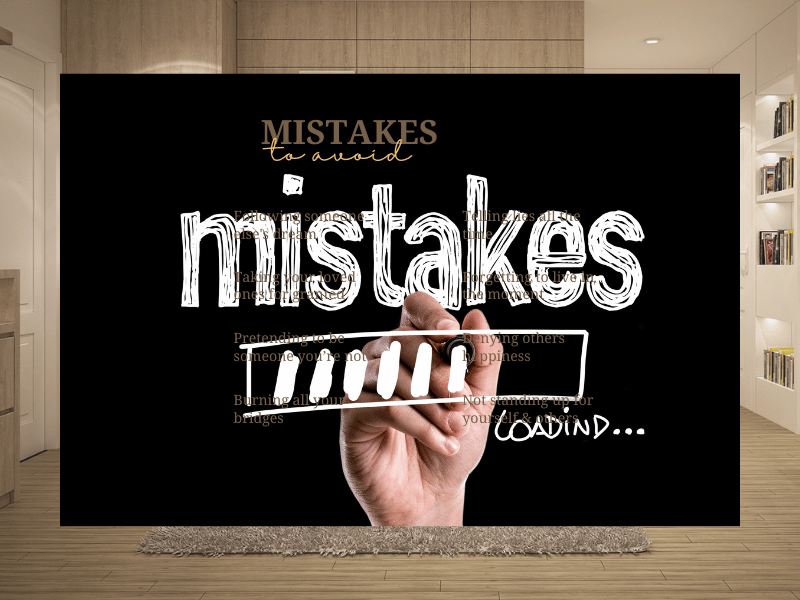
Going through a divorce can be a complex and challenging process, both emotionally and legally. It's natural to feel overwhelmed and unsure about what to do next. However, making certain mistakes during a divorce can have serious consequences, both financially and personally. To help you avoid common pitfalls and make informed decisions, this blog post will outline the top 10 mistakes people often make during a divorce. Whether you're just starting the process or are already in the midst of a divorce, understanding these common mistakes can help you avoid them and move forward with a better outcome.
Mistake 1: Failing to gather financial information and documents before filing for divorce.
One of the biggest mistakes people make during a divorce is failing to gather all the necessary financial information and documents before filing. This includes bank statements, income tax returns, pay stubs, credit card statements, and any other documents that show the couple's assets and debts. This information is crucial for determining a fair division of assets and debts in a divorce settlement.
Solution: To avoid this mistake, it's important to start gathering financial information and documents as soon as possible. You may want to consider hiring a financial advisor or divorce attorney to help you understand what documents are needed and how to gather them. If your spouse is uncooperative, you may need to use a subpoena or other legal means to obtain the necessary information. By being proactive and organized, you can ensure that you have all the information you need to make informed decisions during the divorce process.
Mistake 2: Not having a clear understanding of the divorce process and what to expect.
Another common mistake people make during a divorce is not having a clear understanding of the process and what to expect. The divorce process can be complex and time-consuming, with many legal procedures and requirements that need to be followed. Without a clear understanding of the process, it's easy to become overwhelmed and make mistakes that can have negative consequences.
Solution: To avoid this mistake, it's important to educate yourself on the divorce process and what to expect. This may include reading articles, books, and other resources, talking to friends or family who have been through divorce, or consulting with a divorce attorney. You can also attend a divorce education class or support group to gain a better understanding of the process and connect with others who are going through similar experiences. By having a clear understanding of the divorce process, you can make informed decisions and navigate the process with greater ease.
Mistake 3: Being emotionally reactive and not communicating effectively with the other party.
Emotions can run high during a divorce, which can lead to communication breakdowns and disagreements. This can make it difficult to negotiate a fair settlement and can even lead to increased conflict.
Solution: To avoid this mistake, it's important to stay as calm and rational as possible during the divorce process. This may include seeking therapy or counseling to help you manage your emotions, finding a support system to lean on, and avoiding any actions that may escalate the situation. When communicating with the other party, it's important to be clear, respectful, and to avoid making personal attacks. Seeking the help of a mediator can also be beneficial in resolving conflicts and reaching a mutually acceptable agreement.
Mistake 4: Not considering the long-term financial and personal implications of a divorce settlement.
During a divorce, it's easy to focus on the immediate concerns and not think about the long-term implications of a settlement. This can lead to a settlement that may not be in your best interests, both financially and personally.
Solution: To avoid this mistake, it's important to consider the long-term financial and personal implications of a divorce settlement. This may include seeking the advice of a financial advisor or divorce attorney to help you understand the potential impact of different settlement options. It's also important to think about your future goals and needs and make sure that the settlement reflects those as well.
Mistake 5: Trying to represent oneself in court without proper legal representation.
While it may be tempting to save money by representing oneself in court, this can be a mistake. The divorce process can be complex, and not having a clear understanding of the legal procedures and requirements can lead to costly mistakes.
Solution: To avoid this mistake, it's important to seek the help of a qualified divorce attorney. A divorce attorney can provide valuable guidance and support throughout the divorce process and can help ensure that your rights are protected. If you are unable to afford an attorney, you may be eligible for free or low-cost legal services.
Mistake 6: Failing to consider the needs and well-being of any children involved.
The impact of divorce on children can be significant, and it's important to consider their needs and well-being during the process. This can include ensuring that the children have access to a stable living environment and continuing to have a relationship with both parents.
Solution: To avoid this mistake, it's important to prioritize the needs and well-being of any children involved. This may include seeking the advice of a child psychologist or other mental health professional, and working with the other party to develop a parenting plan that is in the best interests of the children. In some cases, mediation can be useful in resolving conflicts and developing a parenting plan that works for everyone involved.
Mistake 7: Refusing to compromise and negotiate a fair settlement.
During a divorce, it's common to become entrenched in one's position and refuse to compromise. This can lead to a lengthy and costly court battle, and a settlement that is not in either party's best interests.
Solution: To avoid this mistake, it's important to be open to compromise and to work with the other party to reach a fair settlement. This may include seeking the help of a mediator, who can facilitate negotiations and help resolve any conflicts. If necessary, you can also seek the help of a divorce attorney to ensure that your rights are protected and to negotiate a settlement that is in your best interests.
Mistake 8: Failing to accurately value assets and debts in the divorce settlement
It refers to the incorrect assessment of the worth of assets (such as real estate, investments, and personal property) and debts (such as mortgages, loans, and credit card balances) during the divorce proceedings. This can result in an unequal or unfair distribution of the marital property and debts, causing financial difficulties for both parties in the future.
Solution: To avoid this mistake, both parties should work with experienced professionals such as accountants, real estate appraisers, and financial advisors to accurately value the assets and debts. The valuations should be conducted in a transparent and impartial manner, taking into account all relevant factors, such as market conditions, historical trends, and the individual circumstances of each party. Furthermore, both parties should keep detailed records of all assets and debts, including their current value, date of acquisition, and any relevant documentation. This will help ensure a fair and equitable settlement for both parties.
Mistake 9: Not seeking help from mental health professionals to deal with the emotional trauma of divorce
This refers to not seeking support from a therapist or counselor to cope with the psychological and emotional stress of the divorce process. Divorce can be a challenging and overwhelming experience, and it's common for individuals to feel overwhelmed, anxious, and depressed.
Solution: To avoid this mistake, individuals should seek help from a mental health professional to deal with the emotional trauma of divorce. Talking to a therapist or counselor can provide support, guidance, and strategies to help manage the stress and emotions associated with divorce. Additionally, individuals can consider seeking support from support groups, joining a community of people going through similar experiences, or participating in activities and hobbies that bring joy and fulfillment. It's essential to prioritize self-care and to seek help when needed to ensure a smooth and healthy transition through the divorce process.
Mistake 10: Continuing to live an extravagant lifestyle during the divorce process
It refers to maintaining a high level of spending, despite the financial strain that can come with divorce proceedings. This can negatively impact one's financial situation, as it can result in increased debt, decreased savings, and a lower standard of living post-divorce.
Solution: To avoid this mistake, individuals should take a more cautious approach to their spending during the divorce process. It's important to be mindful of the financial impact of any major purchases and to prioritize essential expenses, such as housing, food, and transportation. Additionally, individuals should seek the advice of a financial advisor or budgeting specialist to create a budget and plan for the future. This can help ensure a smooth transition to a more sustainable financial situation post-divorce, allowing for a comfortable standard of living without excessive financial strain.
Conclusion
In conclusion, divorce is a complex and challenging process that can have significant emotional, psychological, and financial consequences. To ensure a smooth and successful outcome, it's important to avoid common mistakes that many people make during the divorce process. These include not hiring a competent attorney, not being honest about assets and debts, failing to plan for the future, and continuing to live an extravagant lifestyle. By being proactive, informed, and mindful of these potential pitfalls, individuals can navigate the divorce process with greater ease and confidence, and emerge with a brighter future ahead.









